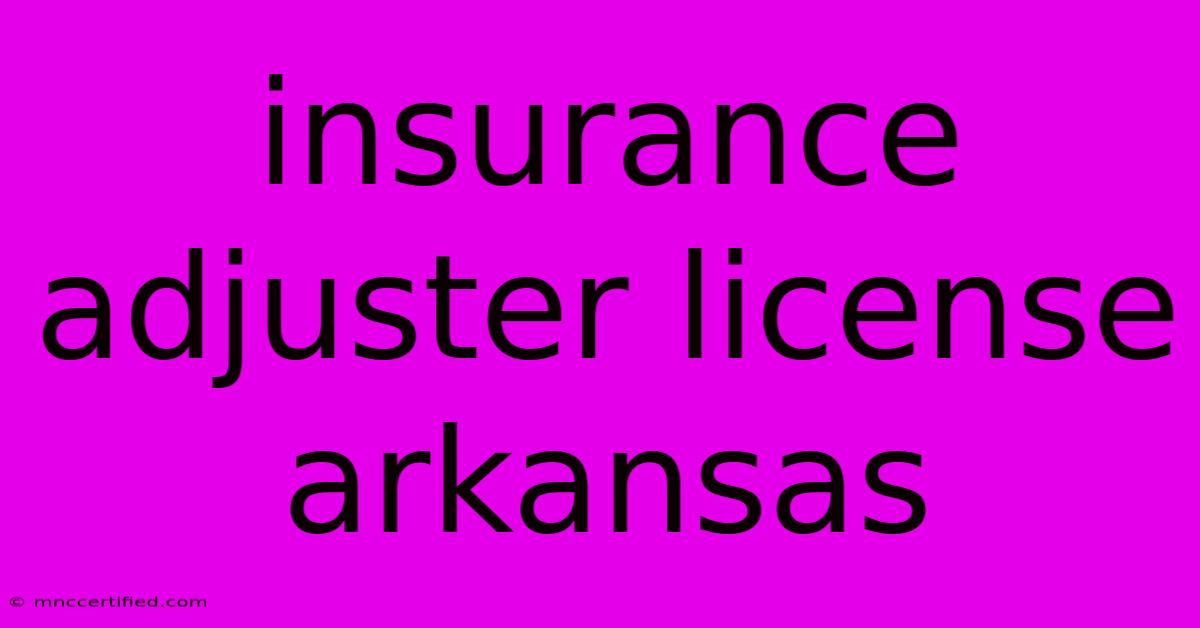Insurance Adjuster License Arkansas

Table of Contents
Navigating the Path to Becoming an Insurance Adjuster in Arkansas: A Comprehensive Guide
Are you interested in a rewarding career that blends problem-solving, communication, and a commitment to helping others? Becoming an insurance adjuster in Arkansas could be the perfect fit for you. This guide will walk you through the essential steps, licensing requirements, and key insights to help you successfully embark on this journey.
Understanding the Role of an Insurance Adjuster
Insurance adjusters play a crucial role in the aftermath of insurance claims. They are responsible for investigating claims, assessing damages, and determining the appropriate amount of compensation for policyholders. This involves:
- Investigating Claims: Gathering information through interviews, site visits, and reviewing documentation to understand the nature of the claim.
- Assessing Damages: Evaluating the extent of property damage or personal injury, often using specialized tools and techniques.
- Negotiating Settlements: Determining the appropriate amount of compensation based on the investigation and assessment, and negotiating fair settlements with policyholders.
Essential Qualifications for Arkansas Insurance Adjusters
To become a licensed insurance adjuster in Arkansas, you need to meet specific qualifications and pass the necessary exams.
1. Education and Experience:
- High School Diploma or GED: This is a fundamental requirement for most insurance adjuster positions.
- Relevant Experience (Optional): While not mandatory, experience in fields like customer service, property management, or construction can be valuable.
2. Licensing Requirements:
- Arkansas Insurance Department: The Arkansas Department of Insurance is responsible for regulating and licensing insurance adjusters.
- Pre-Licensing Education: Completing a state-approved pre-licensing education course is mandatory. These courses typically cover topics like insurance principles, claim handling, and Arkansas-specific regulations.
- Exam: After completing the required education, you must pass the Arkansas Adjuster Licensing Exam administered by the National Insurance Producer Registry (NIPR).
3. Additional Requirements:
- Background Check: A criminal background check is usually required as part of the licensing process.
- Continuing Education: Licensed insurance adjusters in Arkansas are required to complete continuing education courses to maintain their license.
The Licensing Process in Detail:
- Application: Begin by submitting an application for an insurance adjuster license to the Arkansas Department of Insurance.
- Pre-Licensing Education: Enroll in a state-approved pre-licensing education course.
- Exam: After completing the course, schedule and take the Arkansas Adjuster Licensing Exam through the NIPR.
- Background Check: Submit to a background check as part of the licensing process.
- License Issuance: Once you pass the exam and your background check is cleared, the Arkansas Department of Insurance will issue your license.
Key Tips for Success:
- Networking: Attend industry events and connect with other insurance professionals.
- Stay Informed: Keep up with changes in insurance regulations and industry trends.
- Develop Strong Communication Skills: Effective communication is essential for building rapport with policyholders, negotiating settlements, and resolving disputes.
- Problem-Solving Abilities: Insurance adjusters often face complex situations, so developing strong analytical and problem-solving skills is crucial.
Final Thoughts:
Becoming an insurance adjuster in Arkansas requires dedication and effort, but the rewards are significant. You'll play a vital role in helping people recover from unexpected events and build a rewarding career with diverse opportunities for growth. With the right preparation, knowledge, and commitment, you can successfully navigate the licensing process and become a valued insurance professional in Arkansas.

Thank you for visiting our website wich cover about Insurance Adjuster License Arkansas. We hope the information provided has been useful to you. Feel free to contact us if you have any questions or need further assistance. See you next time and dont miss to bookmark.
Featured Posts
-
Cryptic Posts Draw Attention To Singler
Nov 13, 2024
-
Full The Black Parade Performance By My Chemical Romance
Nov 13, 2024
-
Free Agent Catcher Switches To Division Rival
Nov 13, 2024
-
Dogecoin Surges Elon Musks Influence
Nov 13, 2024
-
Trump Selects Noem For Homeland Role
Nov 13, 2024